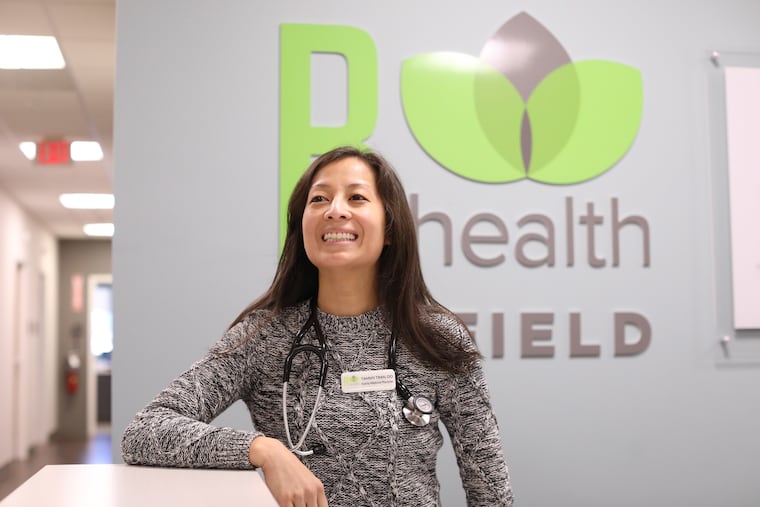This Elkins Park company has a plan to reduce employees' health-care costs
Some employers that offer health insurance are embracing more primary care as a way to reduce long-term medical costs.

Andrew Cavenagh likes to experiment — not in a white-walled laboratory, but in the marketplace of employee health coverage.
“We need employers to be a petri dish" to figure out what saves money and improves quality, said Cavenagh, managing partner of Pareto Captive Services, a Philadelphia company that organizes health coverage for groups of employers that pay their employees' medical bills directly.
Pareto’s latest experiment is a partnership with an Elkins Park company called R-Health to open four primary-care practices in Southeastern Pennsylvania this year to offer expanded and unlimited primary care to Pareto’s clients and other employers for a flat monthly fee of $60 to $80 per member. The first of those sites is scheduled to open this spring in lower Bucks County.
The strategy pursued by Pareto and R-Health, called direct primary care, fits among a wide range of efforts nationally to expand the role of primary care — which accounts for an estimated 6 percent to 7 percent of commercial health care spending — in the health-care system by spending more on that segment and strengthening the relationship between patients and their regular doctors.
“The premise that we are implementing is, let’s spend twice as much money on primary care. Let’s give everyone better primary care, because every dollar we spend there will take $1.50 or $2 somewhere else out of the system,” said Cavenagh.
Among the drivers behind the direct primary-care movement is the rise of high-deductible health plans, which leave many middle- and lower-income individuals unwilling to spend money on a primary-care visit, said Ann Greiner, chief executive of the Patient Centered Primary Care Collaborative in Washington.
There’s a lot of evidence that “robust primary care reduces costs and improves quality,” but she said her organization doesn’t have specific data on the direct primary-care arrangement, which comes in many different forms. “Like lots of experiments in health care, we’ve got to watch it,” she said.
Greiner said she has heard of R-Health through its participation in a direct primary-care pilot in New Jersey for people covered by public-sector health plans. Since that pilot started in the fall of 2016, 4,000 teachers, police, firefighters, and other state and local government employees and retirees have signed up to receive primary care at one of R-Health’s six offices in the state.
“From what I’ve heard about R-Health through the grapevine, they seem to be doing a lot of things right,” she said.
Mason Reiner, cofounder and CEO of R-Health, said the company added 1,000 members during New Jersey’s open enrollment in October. “It’s been growing very nicely,” he said. Because R-Health doctors are limited to 1,000 patients, compared to 2,000 or more across much of medicine, patients get shorter wait times and more time with their doctors, he said.
R-Health’s offices in New Jersey are also open to private-sector employers, such as Ameriflex, which processes payments for health savings accounts and other individual health-care accounts and has an office in Mount Laurel.
The company’s chief executive, William Short, said Ameriflex has been using R-Health in South Jersey and other direct-primary-care providers at other sites around the country for about four years. “We’ve been able to see a savings of around 27 percent from where we were before,” he said.
Short said the company, which also has software that facilitates payments for direct primary-care arrangements, has 120 to 150 participants in direct primary care in South Jersey. The model encourages “better engagement by the patient and the physician,” who is accessible, he said. "That may save an ER visit, an urgent-care visit. That’s where we’ve seen the bulk of the savings.”
Clemens Food Group, a major pork processor, first opened a primary-care clinic at its main plant and headquarters in Hatfield, where 2,300 work, in 2014 because it did not like the number of chronic problems, such as diabetes, high cholesterol, and high blood pressure, that it was seeing among its employees, said Leslie Wheeling, director of CFG Cares. “All of these things that can be prevented very easily, but are much more difficult to reverse,” she said.
R-Health, separate from its deal with Pareto, started to run the clinic in December. “What we like about the R-Health model is that they are very proactive," Wheeling said. "Rather than a doctor’s office waiting for someone to come to them, R-Health has really reached out to help people understand why taking care of their health in a preventative manner is so important.”
It is too soon to know whether R-Health is making a difference, but Wheeling said she is encouraged by what she hears from employees who have visited the clinic. Clemens employees are not required to use the on-site clinic.
At Havertown’s Nolan Painting, which is in its third year of self-insurance with Pareto, owner Kevin Nolan has made it his mission to get more of his 120 employees to go to the doctor for regular checkups.
“Last year we had a hard time getting doctors for everybody,” he said, so he’s looking forward to the opening of the R-Health Clinics..
As to being a petri dish for health care experiments, Nolan said: “It’s fun, as described by me, because I happen to like this stuff. It is definitely exciting.”